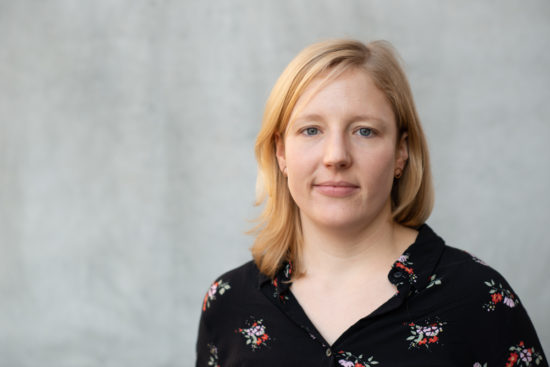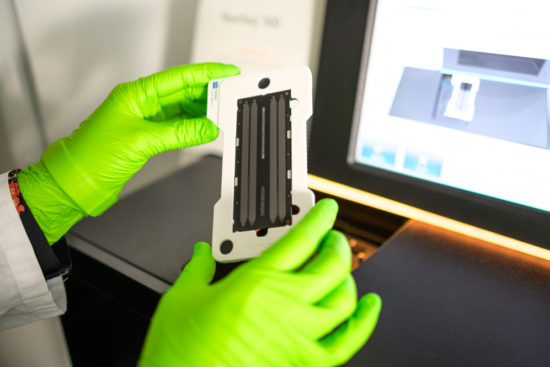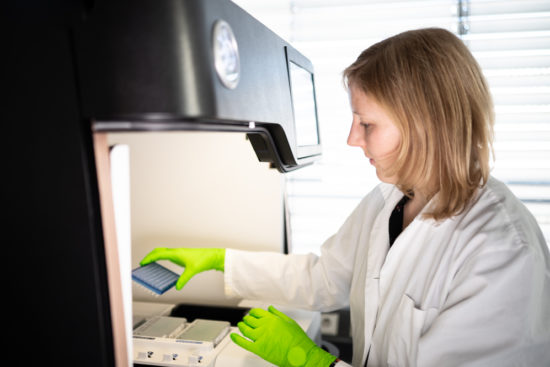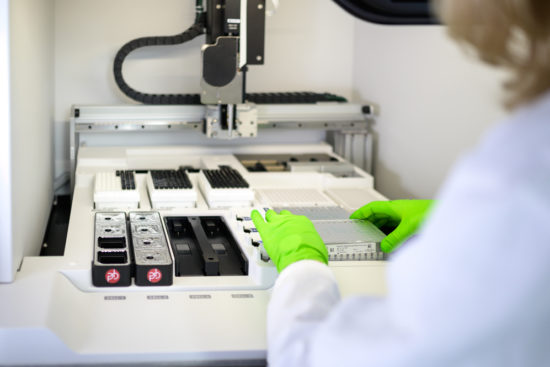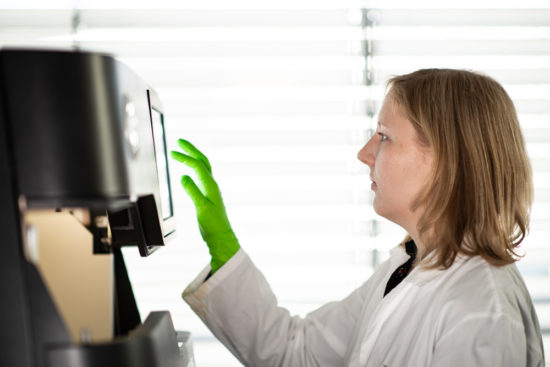First DRFZ postdoc fellowship awarded
Interview with scholarship holder Gitta Heinz
Since 2019, the DRFZ YOUNG TALENTS FELLOWSHIP has been awarded to outstanding young researchers. It is tailored for postdoctoral researchers who are already working at the DRFZ and includes the full salary for two years. .
The first scholarship holder of the DRFZ YOUNG TALENT FELLOWSHIP is Gitta Heinz from the Mashreghi lab. We have asked her what she hopes to achieve during the time of the scholarship. The interview is from 2019.
Gitta Heinz has been a postdoctoral researcher at the DRFZ since 2015. She studied molecular medicine in Ulm and Berlin. After a research stay at the Karolinska Institute in Stockholm, Gitta moved to Munich where she received her PhD in 2015 at the Institute of Molecular Immunology at Helmholtz Zentrum München.
Initially a postdoctoral fellow in the Radbruch lab (cell biology), she has been a member of the Mashreghi lab (therapeutic gene regulation) since 2017.
Gitta, you were the first to receive the new DRFZ Young Talents Fellowship for Postdocs, which ensures your position for 2 years. How did this happen?
The new DRFZ scholarship was created for postdoctoral students who are already working at the DRFZ and is intended to support them in their transition to the next career phase. I submitted my research project and was selected for the fellowship.
You have been a postdoctoral fellow at the DRFZ since 2015. How have you been financed so far? Can you describe your career point at the time of your application?
After completing my doctoral thesis in 2015, I came to the DRFZ as a postdoc. For the first two years, I received a scholarship from the Berlin School for Regenerative Therapies (BSRT). At that time I started to work on the role of a rather new class of regulatory RNA molecules, so-called circular RNAs (circRNAs), in T helper cells in the context of chronic inflammation. After the scholarship expired, I was funded for another two years by my group leader Mir-Farzin Mashreghi through an ERDF (European Regional Development Fund) project. During this time I continued my research and I also established high throughput sequencing of different samples as well as the preparation of libraries from diverse starting materials at the DRFZ.
What is the goal of your research project?
In my research project, I am interested in mechanisms by which T helper cells adapt to and maintain a chronic inflammatory environment. Such mechanisms can be found at all levels of gene regulation and establish a stable pro-inflammatory cell phenotype. This makes it difficult to interrupt inflammatory processes with therapeutics and alleviate symptoms or even cure the disease.
In own preliminary studies, I found a circular ribonucleic acid (RNA), circIkzf1, which is particularly strongly expressed in naïve T helper cells. This molecule consists of parts (exons 2 and 3) of a known regulator of chromatin structures and immune cell development called Ikaros. So far, I have found that this circular RNA molecule translates into protein. However, which task the resulting protein performs in T helper cells is still unknown.
What opportunities does the Young Talents Fellowship offer you and what do you expect from these two years?
The scholarship offers me to investigate the function of circIkzf1 and the new cryptic Ikaros protein in detail. I will use different methods such as high-throughput sequencing to determine gene expression and chromatin composition as well as fluorescence microscopy to investigate the localization of the protein in the cell. I hope to better understand how the activation of T helper cells and the development of a pro-inflammatory phenotype is regulated and fine-tuned by cellular mechanisms. This knowledge can help to develop new therapeutic approaches against chronic inflammatory diseases and autoimmunity.
In the next two years, I will not only be working on the experimental work, but also on the scientific publication of the results. In addition, the scholarship gives me the opportunity to attend scientific congresses and professional training.
What are your medium-term career goals, where are you heading?
I can imagine myself as an independent scientist leading my own research group. I would like to be part of a larger research institute or network in which (interdisciplinary) collaboration and the exchange of expertise are routine. This stimulates science and makes it more effective, e.g. through shared access to research infrastructures and technologies. Being spokesperson of the Leibniz Postdoc Network, my knowledge of science management, strategic planning and science policy topics has expanded. This has enabled me to explore an interesting alternative field of work, which also offers career options in addition to science itself.
You mentioned you are also the spokesperson of the Leibniz PostDoc Network. Many postdocs look forward to their future in research with uncertainty, especially due to the often limited funding. How is your view on the situation of postdocs in Germany? What would you like to see for your career in science?
I learned that the situation of postdocs in Germany can be very different depending on the discipline. However, most of them would like careers to be easier to plan. Personally, I find it important to acknowledge that the majority of postdocs will not (be able to) remain in academia and that other career options must therefore be considered and made more accessible. Good, strategic personnel development at the institutes could provide a great deal of support here. In my opinion, however, scientific careers should be structured better and career development opportunities at the individual institutes should be communicated as openly as possible.

 Deutsch
Deutsch